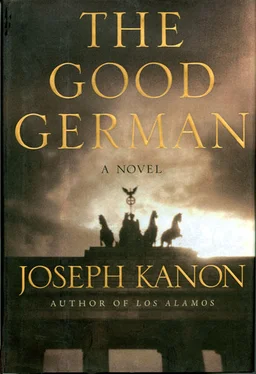“But if I don’t—”
“Then you don’t guess out loud. No mystery body. No unsolved anything. You might get some mileage out of that in the papers. But all we’d get is a lot of questions we can’t answer. That just eats time. We can’t afford that. There’s too much to do. All I’m asking is a little discretion.”
“And tell you in advance what I’m going to say.”
“I didn’t say you couldn’t say it. Just tell me if it’s coming.”
“So you can deny it?”
“No,” Muller said, deadpan. “So I can duck.” He stopped at a door paned with translucent glass. “Here we are. Jeanie should have the copies by now.”
Jeanie was a pretty WAC whose red fingernails seemed too long for serious typing. She was putting carbon sheets into two beige folders and threw Muller a smile that Jake, amused, guessed was more than secretarial. Muller, however, was all business.
“Got those reports?”
She handed him one of the folders, then a message slip. “The general wants you at ten.”
“Come on, then,” he said to Jake, leading him into a plain office with an American flag in the corner. Muller belonged to the clean desk school-the only things on the empty surface were a pen set and a framed picture of a young soldier.
“Your boy?” Jake asked.
Muller nodded. “He was hit on Guadalcanal.”
“I‘ m sorry.
“No, not killed. Wounded. At least he’s out of it now.” Then, avoiding any more intimacy, he opened the folder, took out two carbon flimsies, and pushed them across the desk to Jake. “Service record. Casualty report.”
“You’re calling it a casualty?”
“It’s what we call the report,” Muller said, slightly annoyed. “It’s just a form. Anyway, now you know what we know.”
Jake skimmed the first sheet, a spare listing of dates and assignments. Patrick Tully. Natick, Mass. A little older than the boy in the picture on the desk. The casualty report Jake could have written himself. “Not much, is it?” he said.
“No.”
“What isn’t here? Any trouble before that didn’t make it into the record?”
“Not that I know of. Service record’s clean, no flags. A distinguished member of the United States Armed Forces. That’s what we’re going to write to his mother, anyway.”
“Yes,” Jake said. A person, not a number, a kid with a family, not as lucky as young Muller. “What about the money?”
“She’ll get that too, with his effects. APO money order. It was his, as far as we know. Let’s hope she thinks he saved his back pay.”
“How much was there? It doesn’t say.”
Muller looked at him, then nodded. “Fifty-six thousand marks. They convert at ten to one. So roughly five thousand dollars. That’s what the Russians gave us, anyway. They say some of it blew away.”
“So figure twice that. That’s a lot of back pay.”
“Maybe he was good at cards,” Muller said.
“What brings in that kind of money? On the black market.”
“Watches, mostly. If it ticks, the Russians’ll buy it. A Mickey Mouse can go for five hundred bucks.”
“That’s still a lot of watches.”
“That depends how long he was doing it. If he was doing it. Look, on the record? There is no black market. Sometimes supply depots come up a little short. Things disappear. One of the facts of wartime. The Germans are hungry. They’ll buy food any way they can. It’s about food. Naturally, we’re doing what we can to stop it.”
“And off the record?”
“Off the record, everybody does it. How do you stop a kid in a candy store? Want to do some quick arithmetic? A GFs allowed a carton of cigarettes a week at the PX. A nickel a pack, fifty cents a carton. On the street, it’s worth a hundred dollars-that’s five thousand dollars a year. Add in some chocolate, four bottles of liquor a month, another five thousand dollars. A package of food from home? Maybe some tuna fish, a can of soup? More. Lots more. It adds up. A guy can make a year’s salary just from his rations. You try stopping that. Officially, there’s no fraternization either. So how do we explain all the VD?”
Jake glanced down at the sheet. “He’d only been in Germany since May.”
“What do you want me to say? Some of our boys are more enterprising than others. You don’t have to be a big operator to make money in Germany. Last month our troops were paid about a million dollars. They sent three million home.” He paused. “Off the record.”
Jake stared, staggered by the figure. “I didn’t think the Germans had that much money.”
“The Germans. They’re selling silverware for a stick of margarine. Whatever they’ve got left. The Russians have the money.”
Jake thought of the ragtag guards at the Chancellery, the peasants wheeling carts through Potsdamerplatz, as primitive as a muddy village. “The Russians have that kind of money?” he said dubiously. “Since when?”
Muller looked at him. “Since we gave it to them.” He hesitated. How far off the record are we? “
‘Farther every minute.“
Muller sat back. “I’m going to hold you to that. You see, the original plan was to issue occupation marks. Something all the forces could use here and the locals would accept, not gum up the works with four different currencies. Fine. So the Treasury made up the engraving plates and, like idiots, gave a set to the Russians. Same money. Of course, the idea was they’d keep a strict accounting of theirs, since it would have to be convertible to hard currency-dollars, pounds, whatever. Instead they just started the presses and kept going. Nobody knows how much they made. Most of their troops hadn’t been paid in three years. They got it all in occupation marks. The hitch is, they can’t take them home-the Russians won’t convert them-and now you’ve got a whole army with more money than they’ve ever seen before in their lives and one place to spend it. Here. So they buy watches and whatever else they can carry home. At any price. It’s Monopoly money to them. And meanwhile, since the currency has to be honored, our boys take the marks they get and send them home as dollars and the Treasury has one hell of a drain on its hands. We yell and scream, of course, but I’d lay you even money-in dollars-that we’re never going to see one ruble for those plates. The Russians say their marks just circulate in Germany, keeping the local wheels going-the Germans’ tab. And we have a small problem explaining why so many are flooding back home, since there is no black market-so we pay. We’re paying, in fact, for the Russian occupation here. But nobody wants to touch that story.“ He smiled. ”And neither do you.“
“I’m not even sure I understand it.”
“Nobody understands money. Except what’s in his pocket. Which is lucky for the Treasury. If we’d pulled a stunt like that, they’d court-martial us out of here in no time.”
“So what are you going to do about it?”
“That’s the ten o’clock meeting. General Clay wants to limit the amount a man can send home to his actual pay. It’ll be a headache for the APO, just keeping track, and it won’t solve everything, but at least it’ll stop the worst of the bleeding. Of course they can still send goods home, but the money will stay here, where it belongs. Ultimately, the only thing that’s going to work is a new currency, but don’t hold your breath. How fast do you think the Russians would agree to that?”
“I mean, what are you doing on the ground? How do you police it?”
“Well, it’s a problem. MP raids the worst spots from time to time, but that’s just a little finger in the dike. Berlin’s an open city-people go where they want-but it’s just administered in zones. So we can’t patrol Zoo Station, that’s the Brits. Alexanderplatz is in the Russian zone.“
Читать дальше












